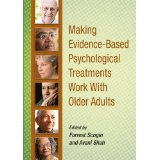“Making Evidence-Based Psychological Treatments Work With Older Adults”

“Making Evidence-Based Psychological Treatments Work With Older Adults”
Edited by Forrest Scogin and Avani Shah
American Psychological Association
Washington, D.C., 2012
Book useful for those in elderly care realm
Reviewed by James K. Luiselli, Ed.D., ABPP, BCBA-D
The introduction to this book says it all: “Older adults comprise a substantial and rising portion of the populace and thus it is important that we bring the best available knowledge to bear on the often complex health and behavioral problems presented by older people.”
In a clever format, Forrest Scogin and Avani Shah assembled five teams of authors to review the psychological treatment literature for anxiety, depression, insomnia, memory, disruptive behaviors in dementia and caregiver distress. The teams conducted their reviews according to a coding manual for identifying evidence-based treatments (EBTs).
Each of the seven chapters in the book begins with a brief description of the content area. Next, the authors describe pertinent EBT research and highlight the most effective procedures. A third section presents recommendations for adapting EBTs to clinical settings, nicely illustrated with a detailed case example. The chapters conclude with an appendix section (recording forms, questionnaires, therapy guides) and a list of relevant publications. Having the chapters arranged similarly is a useful organizational tactic for helping readers navigate from one topic to another.
Among several themes that apply to EBTs, the book asks, “How does an individual clinician implement specific interventions with a particular client, remaining true to evidence-based principles of care while at the same time, tailoring the intervention to the needs of the client?” Most of the authors agree that practitioners should be knowledgeable about the current literature and willing to follow validated protocols that deviate from familiar practices. As the book suggests, creativity in the area of geropsychology is fostered when mental health professionals combine evidence-based methods that are matched to a client’s clinical presentation.
Another common theme of the book is choosing a therapeutic plan that conforms to personal preferences and life circumstances. Many older adults, for example, will have cognitive, physical and perceptual limitations that demand adaptations to conventional therapies. The book is sensitive to these matters as well as medical contraindications and environmental factors that may constrain access to services.
Although there have been advances in the psychological treatment of elderly people, the field is still evolving and relatively few resources are available to the professional community. “Making Evidence-Based Psychological Treatments Work With Older Adults” is a terrific example of research-to-practice translation that adds to the extant literature and will help define practice standards. The information is presented clearly, reflects the best contemporary thinking and was written with the practitioner in mind. This is an ideal resource for students, trainee, and practitioners who wish to learn more about and improve their therapeutic skills with a highly vulnerable population in need of exemplary care.
James K. Luiselli, Ed.D., ABPP, BCBA-D, is senior vice president, applied research, clinical training and peer review at the May Institute in Norwood, Mass.
Learn more about the book: Making Evidence-based Psychological Treatments Work With Older Adults
